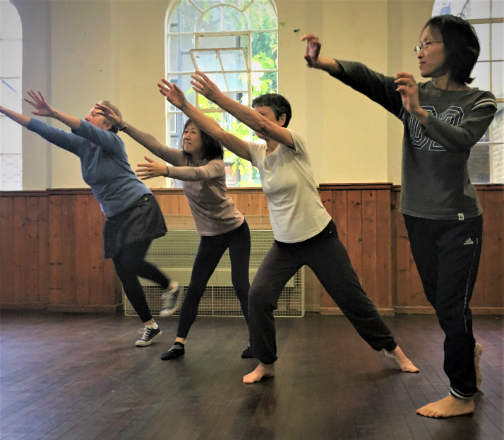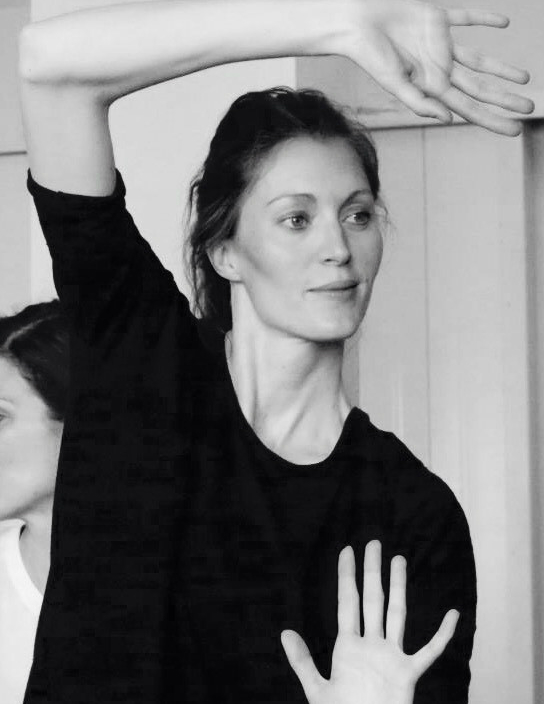Community dance sessions for women affected by cancer help address gap in support
Thu 26 April 2018Weekly community dance sessions have shown significant benefits for women affected by cancer, are addressing a recognised need for post treatment support, and are now increasing in popularity across London.
Emily Jenkins launched Move Dance Feel in 2016 at the Bromley by Bow Centre while researching the benefits of dance in this context for an MA in Creative Practice at Trinity Laban.
In witnessing the devastating effects that cancer can bring to people’s lives, and how it can be consuming both physically and emotionally, Emily started Move Dance Feel to help address a gap in support. She learned that 70% of people who have had cancer still experience negative physical and emotional effects years after treatment.
Her research during the project’s pilot found a definite overlap with the psychological ‘PERMA model’ of wellbeing: women who took part reported greater levels of positivity, improved relationships, feelings of accomplishment and more ability to manage challenges.
In contrast to typical models of care reliant on people verbalising their experience of cancer, dance gives women of all ages, backgrounds and nationalities an alternative way to communicate.
Participants engage with the dance sessions as a means of self-expression, a chance to “re-invent themselves” and to find freedom in the body. One woman explained in a focus group: “After cancer you have to kind of reinvent yourself… you can’t go back to who you were before, you have to find a new normal.”

In February 2018 Emily received her first grant from Arts Council England for £14,910, and also raised more than £2,400 of a £4,000 crowdfunding target in just a week, having launched the campaign on International Women’s Day.
In 2018-19 she is introducing Move Dance Feel to Maggie’s Barts at St Bartholomew’s Hospital (City of London) and Paul’s Cancer Support Centre in Battersea, and is continuing provision with a local Macmillan Social Prescribing Service in Bromley by Bow.
There has also been interest in Europe as Emily was invited to present her work at the Dance and Creative Wellness Forum in France in February.
Having built the project solo, Emily will now recruit additional dance artists to train in this area, while also continuing to research the impact of dance on mental and physical wellbeing.
With support from Trinity Laban’s Learning and Participation team, she is currently working with Dr Kate Wakeling to gather further evidence on the benefits of dance in supporting cancer recovery, and how it can reduce negative side effects.

(Emily Jenkins)
So why dance, specifically?
“When going through cancer treatment, the body is surrendered, handed over to doctors and controlled by the cancer itself,” Emily explains. “This can cause a degree of trauma to the body, where sensory and emotional connections to it become damaged and in some cases severed.
“What dance offers in this context is a means of returning to the body and reclaiming control, taking back ownership and in the process reigniting lost connections.”
Emily’s dance practice incorporates the use of touch, which is an important aspect of Move Dance Feel sessions. During cancer treatment, touch can become functional and confronting, Emily says:
“By reintroducing it in a safe and nurturing manner one can affect change through touch and alleviate feelings of tension and anxiety… I’ve found that participants develop feelings of acceptance towards themselves and others, appreciating their body as others acknowledge it as a source of inspiration and pleasure.”
Some 2.5 million people in the UK are currently living with cancer and by 2020 it is estimated that almost one in two people will get cancer at some point in their lives. It is predicted that over the next 20 years cancer rates will rise six times faster in women than in men, as breast, ovarian, womb and cervical cancer become more prevalent.
Emily explained that she chose to host women-only groups “to ensure participants could trust and relate to one another in a safe environment. Whilst all cancers are devastating, cancers that affect women such as breast and womb can be incredibly invasive, with treatments causing complex repercussions… the removal of reproductive organs can cause physical and emotional distress as women are forced to deal with radical changes to their bodies. They must adjust, adapt and live with an altered image of themselves.”
A female only group has generated an immense feeling of intimacy and honesty, with one woman describing the group as a family. Challenges – both inside and outside the dance space – are shared. Participants are compassionate and encourage one another, impacting on their sense of ability and resilience.
Collaborations and creativity has flourished. When a participant was unable to dance for a few weeks due to surgery she still attended and instead brought along art materials to draw the others dancing.
“Move Dance Feel brings women together each week to be active, creative and most importantly to laugh and have fun,” Emily adds. “Women have the freedom to jest and be comical with each other, which is a welcome relief from the seriousness of cancer.”
Visit facebook.com/movedancefeel and @MoveDanceFeel to find out more
About Emily Jenkins: Emily holds a degree in Performing Arts, Communication and Culture from Oxford Brookes, and later came to Trinity Laban to study for a Postgraduate Diploma in Community Dance and then complete her MA. She works in London for Trinity Laban Learning and Participation (dance) and English National Ballet, and previously for Rambert, Siobhan Davies Dance and Charlotte Spencer Projects.
(Images used with permission)
